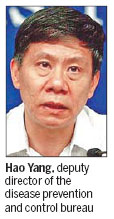Politics
AIDS drug could see mandatory licensing
Updated: 2011-06-25 07:28
By Shan Juan (China Daily)
Government hopes to keep costs low for expansion of preventive program
BEIJING - China is considering mandatory licensing to secure cheaper drugs for HIV/AIDS patients, particularly as the nation's health authority is preparing to expand coverage for the preventive antiretroviral therapy (ART).
Very soon, couples with one partner having HIV/AIDS and the other being negative - estimated at 30,000 on the mainland - will be offered free ART, Hao Yang, deputy director of the disease prevention and control bureau at the Ministry of Health, told China Daily in an exclusive interview.
Currently only full-blown AIDS patients are given that.
Studies have found that if an HIV-infected person who has not developed full-blown AIDS adheres to an effective ART regimen, the risk of transmitting the virus to their uninfected sexual partner can be reduced by 96 percent.
The notion of early treatment for prevention is highly recommended by the World Health Organization and UNAIDS.
|
|
Chinese experts with the Ministry of Health are now busy drafting a new protocol and organizing training for medical workers and community-based organizations, Hao said.
"Once in practice, the drug supply has to be tremendously increased and to secure affordable AIDS intervention we don't rule out the possibility of issuing compulsory licensing for patented pharmaceuticals needed for ART," he said.
Last January, China amended a patent regulation to give a clear definition of "patented pharmaceuticals" that are subject to compulsory licensing.
Yin Xintian, director of the legal affairs department of the State Intellectual Property Office, said the move aimed to make the compulsory licensing system compatible with the need to cope with public health crises and benefit the people.
China has an estimated 740,000 people living with HIV/AIDS on the mainland and 100,000 full-blown AIDS patients are on ART treatment provided free by the government, official statistics show.
However, Mark Stirling, country coordinator of the UNAIDS China Office, said that as China's need for the drug increases substantially due to expanded treatment for prevention, the government could bargain with international suppliers for a lower price.
"Stakeholders including the government, community-based organizations and domestic pharmaceutical companies should first be organized to look at the cost of compulsory licensing," he said.
Besides cost concerns, efforts need to be made in community mobilization and adapted delivery systems to put the new notion into practice in China, said Nicole Seguy, HIV Medical Officer of the WHO Beijing Office.
Wu Zunyou, director of the National Center for AIDS and Sexually Transmitted Diseases Control and Prevention, conceded that China still faces challenges including patient education and doctor training.
"Medical workers have to be trained to persuade sufferers who have yet developed any symptoms to take the medicines, which to some extent bring certain side effects," he said.
He urged civil societies that have a special approach to reach the sufferers to participate in the campaign.
Thomas Cai, who heads AIDS Care China, a Guangzhou-based NGO that provides support to patients and their families, said: "Civil societies would help facilitate a more sufferer-centered approach for the new move."
E-paper

Franchise heat
Foreign companies see huge opportunities for business
Stitched up for success
The king's speech
Tough sail
Specials

Premier Wen's European Visit
Premier Wen visits Hungary, Britain and Germany June 24-28.

My China story
Foreign readers are invited to share your China stories.

Singing up a revolution
Welshman makes a good living with songs that recall the fervor of China's New Beginning.

